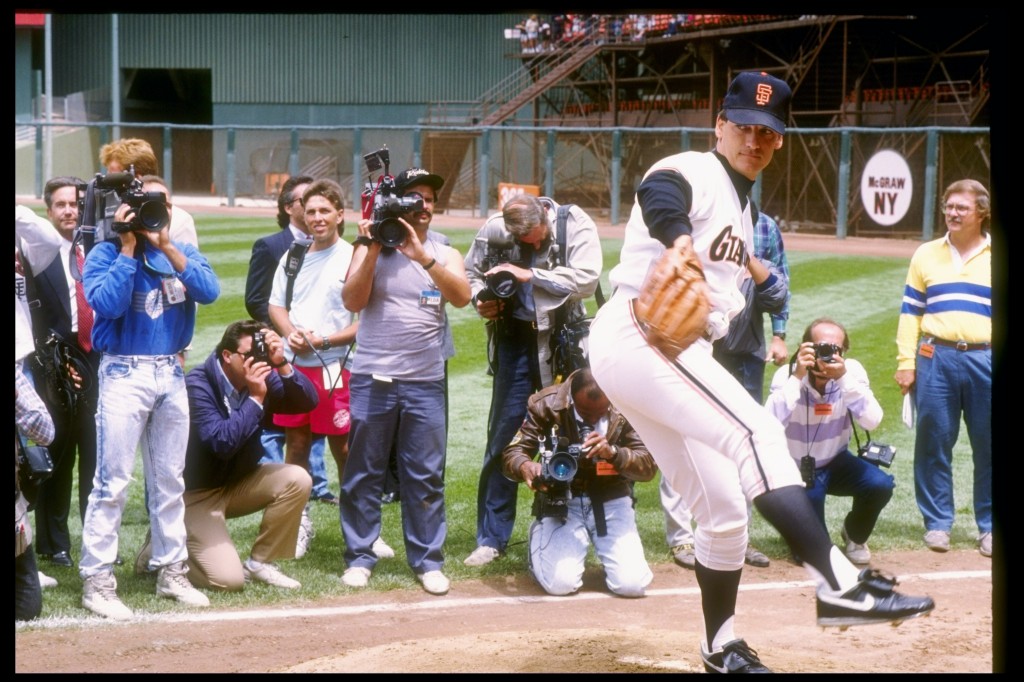What’s your best advice for writers? Yeah, you

Dave Dravecky warms up in front of a small section of the media scrum on Aug. 10, 1989. Your blogger was high above the right-field bleachers, background.
This blog has been offering up great advice from great sportswriters, but what can you, wise Bleacher Report readers and writers, teach each other?
I’d like to invite you to use the comments to offer up the best advice you’ve ever been given about being a writer, or the best advice you have to offer. Have you had an “aha” moment?
I’ll kick it off with an “aha” moment of my own. At the end of Joe Posnanski’s advice about staying humble, I promised to tell a story that I’d been reminded of by the advice Joe’s editor had given him: “If you find yourself in a large group of reporters, you’re probably in the wrong place.” Here it is.
In 1989, San Francisco Giants left-hander Dave Dravecky made a dramatic comeback from cancer and arm surgery. He’d had a significant chunk of muscle removed from his pitching arm and wasn’t expected to pitch again, but he returned for a game at Candlestick Park on Aug. 10, 1989, almost 15 months after his last appearance.
I was working on an unrelated story for the Oakland A’s magazine, so when batting practice ended, my job for the day, interviewing players and coaches about the subject of my article, was done. I could enjoy a day at the yard.
I decided to kill time before the first pitch with a walk around the big, circular stadium, a lap along the walkway at the front of the upper deck. As I strolled in the outfield sections, Dravecky made his way to the bullpen down the first base line, trailed by a massive pack of photographers and reporters, a scrum fit for a president or a pop star.
As Dravecky began his warmups, the media members, maybe 100 strong, arrayed themselves in a huge crescent starting behind the catcher and curling all the way past Dravecky and the mound. Dozens of photographers snapped away, at points four or five deep, all getting … the exact same picture!
Each photographer’s shot was a degree or two different from the shot of the person over, but they were all pretty much the same: Dave Dravecky warming up in the bullpen, looking pretty much like every other pitcher who ever warmed up in a bullpen.
I was a few hundred feet above all this wishing I had a camera, because I was looking at a great shot.
That massive crowd of photographers jostling for a shot of Dravecky warming up told the story: This was no ordinary start, no ordinary game. It was a remarkable day, a remarkable story, and that picture, had I been able to take it, would have captured a huge part of it.
That was an aha moment for me. I was just starting out, and that day taught me, as Joe Posnanski’s editor taught him, to stay out of crowds of reporters. Get yourself out of that pack to get a better perspective — and most likely a much better story.
It works figuratively just as well as literally. If you’re part of a consensus, does the world really need to hear your voice? Look for a way to step out of the crowd.
-
http://www.baseballprospectus.com Colin Wyers
-
http://www.robbtodd.com Robb Todd
-
Tim Bielik
-
http://www.google.com/ Emma
-
Luis De Leon
-
Jordan Lewis
-
Sean
-
Sean
-
Adam Koscielak
-
http://bleacherreport.com/users/485307-roy-burton Roy Burton
-
Jon Sainz
-
Cian Fahey
-
Bleach

